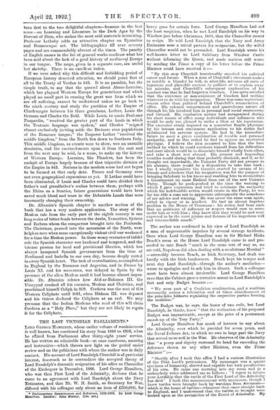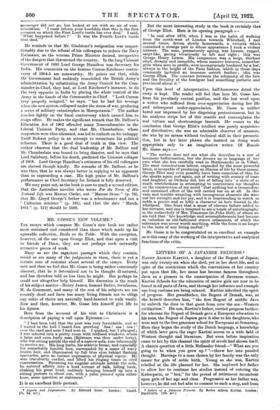THE LAST VICTORIAN PARLIAMENTS.*
Lorin GEORGE Ilaterrarote, whose earlier volume of reminiscences is well known, has continued his story from 1886 to 1906, when he Aired from Parliament after thirty-eight years' service. He has written an admirable book—at once courteous, amusing and instructive—which throws new light on the period under review and on the politicians with whom the author was in daily contact. His account of Lord Randolph Churchill is of particular interest, inasmuch as he contradicts the accepted theory of Lord Randolph's dramatic resignation of his office as Chancellor of the Exchequer in December, 1886. Lord George Hamilton, who was then First lord of the Admiralty, declares that he came to an agreement with Lord Randolph about the Navy Estimates, and that Mr. W. H. Smith, as Secretary for War, differed with his colleague only about an item of £200,000, for • Parliamentary Reminfeceners and Brfledione, 1880-1906. Zs Lord George alamilton. London: John Murray. [155. net.] heavy guns for certain forts. Lord George Hamilton had not the least suspicion, when he met Lord Randolph on his way to Windsor just before Christmas, 1886, that the Chancellor meant to resign. He told Lord Randolph that the Navy and Army Estimates were a trivial pretext for resignation, but the wilful Chancellor would not be persuaded. Lord Randolph wrote his well-known letter to Lord Salisbury from Windsor Castle without informing the Queen, and made matters still worse by sending the Times a copy of his letter before the Prime Minister could have received it :- " By this step Churchill irretrievably smashed his political career and future. When a man of Churchill's cleverness makes so terrible a blunder ho will, in after-life, advance all sorts of ingenious and plausible excuses to palliate or to explain away his mistake, and Churchill's subsequent explanation of his conduct was that he had forgotten Goschen. I am quite satisfied that the existence or non-existence of Goschen had nothing whatever to do with his resignation. There was some mysterious reason other than political behind Churchill's renunciation of office. His volcanic temperament and quarrelsome nature all through his life involved him in personal and social controversy and turmoil. His combative nature had antagonized during his short tenure of office many individuals and influences who would bo only too pleased to strike a blow at his reputation. The excessive strain imposed on a somewhat fragile physique by his intense and continuous application to his duties had unbalanced his nervous system. lie had in the immediate future to meet a grave combination of trouble and personal antipathy, and to this ordeal ho had to oppose an enervated physique. I believe the idea occurred to him that the best method by which ho could extricate himself from his difficulties and start afresh would be to dissociate himself wholly from office, and take a short rest abroad. His present and impending troubles would during that time probably diminish, and if, as ho thought not improbable, the Unionist Party did not prosper in his absence, there would be a disposition to take him back ; but I wholly repudiate the theories started by certain of his friends and admirers that his resignation was for tho purpose of bringing Salisbury to his knees and enabling him to reconstitute a Government on more Radical lines out of the new Unionist Party. Though he pooh-poohed at the time the warning to which I gave expression and tried to minimize the antipathy which his indefensible action would create in the Party, ho was far too able a man not to appreciate subsequently the soundness of my advice and warning. He was never the same man again, either in vigour or in intellect. He had an almost hopeless position in the House of C01111110138 : his action had been such that no politician of influence or respect would rare to servo under him or with him ; they know that they would bo and were expected to be the more jetsam and flotsam of his imperious will and irreconcilable moods."
The anther was confirmed in his view of Lord Randolph as a man of ungovernable impulses by several strange incidents. Once when Lord George Hamilton was in Sir Michael Hicks Beach's room at the House Lord Randolph came in and pro- ceeded to rate Beach " much in the same sort of way as, we are told, Napoleon did when dealing with a recalcitrant Marshal " —ostensibly because Beach, as Irish Secretary, had dealt too hardly with the Irish landowners. Beach kept his temper and next day Lord Randolph—through the author's mediation— wrote to apologize and to ask him to dinner. Such a colleague must have been almost intolerable. Lord George Hamilton says that the Cabinet gave a tentative assent to Lord Randolph's first and only Budget because :— " We were part of a Coalition combination, and a coalition necessarily means a relaxation and at times abandonment of the principles hitherto regulating the respective parties forming the coalition."
The Budget was, he says, the lesser of two evils, but Lord Randolph, he thinks, knew " that the realization of his proposed Budget was impracticable, except at the price of a permanent
smash-up of the Tory Party."
Lord George Hamilton has much of interest to say about the Admiralty, over which he presided for seven years, and the Naval Defence Act, to which we owe in large part the Navy that served us so well in the War. He observes of the Admiralty that " a pomp and dignity surround its head far exceeding the deference shown to any other Minister, even the Prime Minister " :—
" Shortly after I took this office I had a curious illustration of the First Lord's pretensions. My messenger was a quaint specimen of humanity, shrewd and capable but with peculiarities of his own. He came one morning into my room and in a melancholy voice addressed me as follows : ' I regret to inform your Lordship that the turtle of the First Lord of the Admiralty has died.' I took this announcement with unconcern, though I knew turtles wore brought back by warships from Ascension— which is the home of turtles—whenever they came straight back to England, and I understood that the turtles so brought were looked upon as the perquisites of the Board of Admiralty. My
messenger did not go, but looked at me with an air of com- miseration. ' I must inform your Lordship that this is the first occasion on which the First Lord's turtle has ever died.' I said, What happened before ? " It was the Fourth Lord's turtle that died.' "
Ho reminds us that Mr. Gladstone's resignation was unques- tionably due to the refusal of his colleagues to reduce the Navy
Estimates, as the veteran Prime Minister desired, irrespective of the dangers that threatened the country. In the long Unionist Government of 1895 Lord George Hamilton was Secretary for India. His comments on the famous Curzon-Kitchener contro- versy of 1904.5 are noteworthy. He points out that, while the Government had suddenly remodelled the British Army's
administration by substituting the Army Council for the Com- mander-in-Chief, they had, at Lord Kitchener's instance, to do the very opposite in India by placing the whole control of the Army in the hands of the Commander-in-Chief. " Lord Curzon very properly resigned," he says, " but he had his revenge
when the new system collapsed under the stress of war, producing a series of military catastrophes in Mesopotamia." The author touches lightly on the fiscal controversy which caused him to resign office. He makes the significant remark that Mr. Balfour's Education Act of 1902 offended many Nonconformists in the Liberal Unionist Party, and that Mr. Chamberlain, whose supporters were thus alienated, was led to embark on his unhappy Tariff Reform policy in an attempt to resuscitate his political influence. There is a good deal of truth in this view. The author observes that the dual leadership of Mr. Balfour and Mr. Chamberlain was bound to bring disaster, and he says that Lord Salisbury, before his death, predicted the Unionist collapse of 1906. Lord George Hamilton's estimates of his old colleagues are shrewd though kindly. He remarks of Mr. Balfour, as he was then, that he was always better in replying to an opponent than in expounding a case. His high praise of Mr. Balfour's performance as Chief Secretary for Ireland is fully deserved. We may point out, as the book is sure to reach a second edition,
that the Australian novelist who wrote For the Term of His Natural Life was Marcus Clarke, not " Marcus Stone " (p. 78), that Mr. Lloyd George's father was a schoolmaster and not a
Unitarian minister " (p. 191), and that the date " March, 1881 " (p. 111) should be 1888.



































 Previous page
Previous page